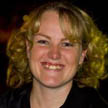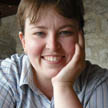I’m a Scientist is like school science lessons meet the X Factor! School students choose which scientist gets a prize of $1000 to communicate their work.
Scientists and students talk on this website. They both break down barriers, have fun and learn. But only the students get to vote.
This zone is the Disease Zone. It has scientists studying the causes and processes of illness . Who gets the prize? YOU decide!









When I was at school, we had all different levels of students, just like you probably do in your class. When I was in high school, I was somewhere in the middle; I got ‘A’s sometimes, but a lot of the time it was a ‘B’ or ‘C’ on the report card at the end of semester. I passed chemistry in high school by 1%! For those starting to think about university entrance rankings, I got 69.96 when I sat the NTCE.
In university, it was the same again. You have people who get high marks, and people who get low marks. I did better in university, because I learn better when I have more control over *how* I learn. I learn much better when I can do the thing I’m being taught, when I can talk it over with other people, and I can read lots of different explanations of the same thing. In some of my subjects, like molecular biology and ecology, I did really well, but I was still really REALLY bad at chemistry. The thing you learn at university is that grades aren’t always the most important thing. I had a friend who was at the top of our class, passing every test 100%, but 6 months later, he couldn’t tell you anything we had learnt that semester. I wasn’t at the top of my class, but I remembered things that would help me in the future. I sucked at exams, but I was good at writing essays, and doing practical work, actually applying what we had learnt in class, and still remember a lot of what we did during our degree.
I now help teach some university students, and it is exactly the same for them. We have some students who get everything right, and some who have trouble. To me, that just says I haven’t found the right way of explaining things to them yet.
As a scientist, I work with people that were the top of their class at school, but they are not necessarily better at their current work than I am at mine. More often, people I work with are just like me, people who weren’t at the top of their class, who work hard to learn all they can. It is more important to learn and remember new skills and new ways of thinking, rather than just studying to pass a test or exam, and forgetting everything else.
0
When I went to school we had people of all different levels. And by the time I got to senior, I was the only person who wanted to study science, so I studied using School of the Air…. I sometimes got “A’s, except for physics, because there is waaaay too much maths in that for my liking!
At university it was the same, some people got really good marks, others not so good.
Its important to remember that not everyone learns things the same way – some people are great at reading something and remembering it forever, while other people need to do the practical work to really see something in action so they can remember a concept. Its just a matter of working out how you learn best and going from there. For example, I found at university that I really learned things well when I could explain them to other people – so I found myself becoming an unofficial tutor for my class which helped everyone out!
0
While I was teaching biochemistry in Korea, usually there were approximately 30 % of A students in biochemistry. The rate of A in other subjects is about the same.
In Nepal, among 9 of my PBL(Problem Based Learning) group students, I gave A to 8 of them. However, I do not know how they do in other subjects. I don’t think there is no class full of straight ‘A’ students, neither a few only in any class.
0
Probably same as your class, a mix of students. I was an average student, not super smart, but not super dumb either. Funny enough, the only subject I actually failed was Dutch, and what’s even more stupid is that I am Dutch…..I grew up in the Netherlands and the only subject I couldn’t do was my own language (grammar)….
0
I’m not teaching right now, so I don’t have a class to tell you about. Other people have answered about the classes that they were in during school, and I can say that in Canada where I went to school it was largely the same as they’ve said: a mix of students, some high-achieving and others not so much. Vanessa makes a great point about how it’s important to be able to remember and apply the knowledge you learn during your courses; anything you can do to apply the stuff you learn will help you immensely whether you go on to be a scientist or not.
0